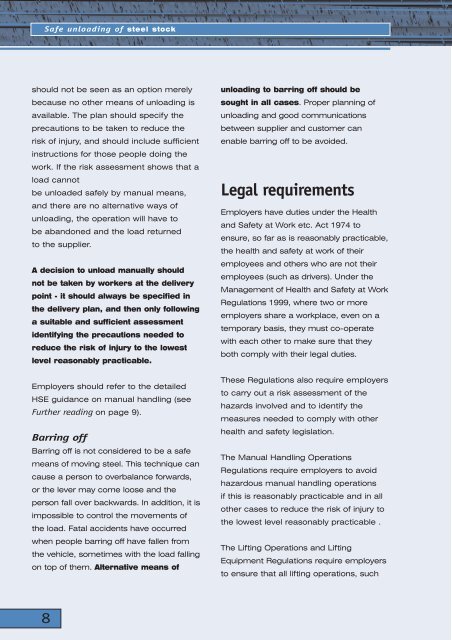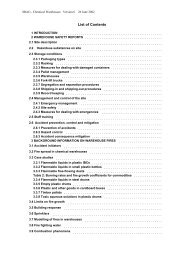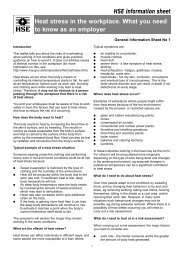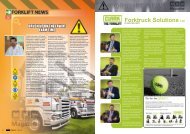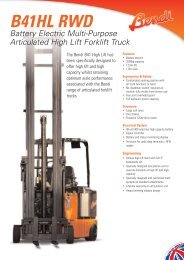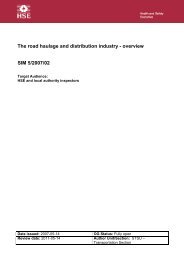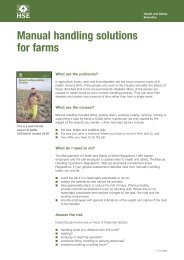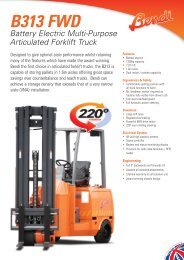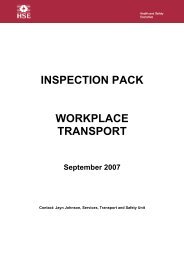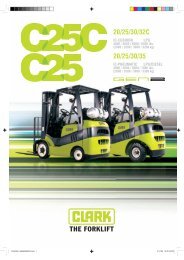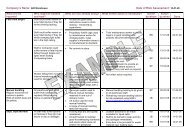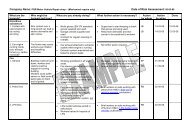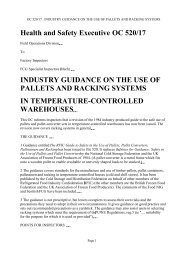Safe unloading of steel stock Safe unloading of steel stock
Safe unloading of steel stock Safe unloading of steel stock
Safe unloading of steel stock Safe unloading of steel stock
Create successful ePaper yourself
Turn your PDF publications into a flip-book with our unique Google optimized e-Paper software.
<strong>Safe</strong> <strong>unloading</strong> <strong>of</strong> <strong>steel</strong> <strong>stock</strong><br />
should not be seen as an option merely<br />
because no other means <strong>of</strong> <strong>unloading</strong> is<br />
available. The plan should specify the<br />
precautions to be taken to reduce the<br />
risk <strong>of</strong> injury, and should include sufficient<br />
instructions for those people doing the<br />
work. If the risk assessment shows that a<br />
load cannot<br />
be unloaded safely by manual means,<br />
and there are no alternative ways <strong>of</strong><br />
<strong>unloading</strong>, the operation will have to<br />
be abandoned and the load returned<br />
to the supplier.<br />
A decision to unload manually should<br />
not be taken by workers at the delivery<br />
point - it should always be specified in<br />
the delivery plan, and then only following<br />
a suitable and sufficient assessment<br />
identifying the precautions needed to<br />
reduce the risk <strong>of</strong> injury to the lowest<br />
level reasonably practicable.<br />
Employers should refer to the detailed<br />
HSE guidance on manual handling (see<br />
Further reading on page 9).<br />
Barring <strong>of</strong>f<br />
Barring <strong>of</strong>f is not considered to be a safe<br />
means <strong>of</strong> moving <strong>steel</strong>. This technique can<br />
cause a person to overbalance forwards,<br />
or the lever may come loose and the<br />
person fall over backwards. In addition, it is<br />
impossible to control the movements <strong>of</strong><br />
the load. Fatal accidents have occurred<br />
when people barring <strong>of</strong>f have fallen from<br />
the vehicle, sometimes with the load falling<br />
on top <strong>of</strong> them. Alternative means <strong>of</strong><br />
<strong>unloading</strong> to barring <strong>of</strong>f should be<br />
sought in all cases. Proper planning <strong>of</strong><br />
<strong>unloading</strong> and good communications<br />
between supplier and customer can<br />
enable barring <strong>of</strong>f to be avoided.<br />
Legal requirements<br />
Employers have duties under the Health<br />
and <strong>Safe</strong>ty at Work etc. Act 1974 to<br />
ensure, so far as is reasonably practicable,<br />
the health and safety at work <strong>of</strong> their<br />
employees and others who are not their<br />
employees (such as drivers). Under the<br />
Management <strong>of</strong> Health and <strong>Safe</strong>ty at Work<br />
Regulations 1999, where two or more<br />
employers share a workplace, even on a<br />
temporary basis, they must co-operate<br />
with each other to make sure that they<br />
both comply with their legal duties.<br />
These Regulations also require employers<br />
to carry out a risk assessment <strong>of</strong> the<br />
hazards involved and to identify the<br />
measures needed to comply with other<br />
health and safety legislation.<br />
The Manual Handling Operations<br />
Regulations require employers to avoid<br />
hazardous manual handling operations<br />
if this is reasonably practicable and in all<br />
other cases to reduce the risk <strong>of</strong> injury to<br />
the lowest level reasonably practicable .<br />
The Lifting Operations and Lifting<br />
Equipment Regulations require employers<br />
to ensure that all lifting operations, such<br />
8


